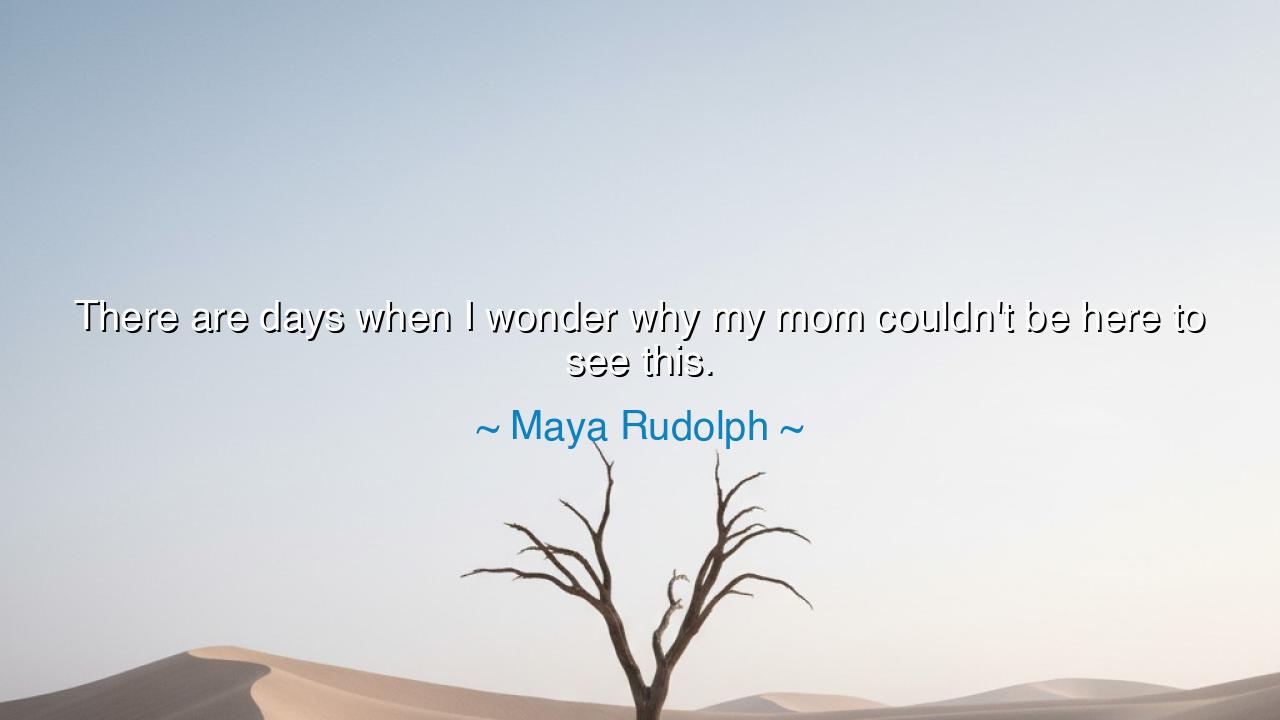
There are days when I wonder why my mom couldn't be here to see






“There are days when I wonder why my mom couldn’t be here to see this.” — Maya Rudolph
In this quiet and aching confession, Maya Rudolph gives voice to one of the oldest and deepest sorrows known to humankind — the longing for a loved one who has gone beyond the reach of time. Her words, though simple, carry the weight of eternity. They are not just the reflection of a daughter missing her mother, but the cry of every soul that has achieved something beautiful and wished to share it with the one who once believed in them most. The ancients would have called this feeling nostos, the homesickness of the heart — the desire not to return to a place, but to a presence.
When she says, “There are days when I wonder why my mom couldn’t be here to see this,” she speaks not in bitterness, but in the soft bewilderment that comes from love unfulfilled by time. The human spirit is torn between gratitude and grief: gratitude for having known such love, and grief for its absence. This is a paradox as old as life itself. For as long as humans have loved, they have mourned. The ancients carved their grief into stone; the poets sang it into memory. In Maya’s words, we hear that same timeless song — a lament, yes, but also a remembrance that love, once given, never truly dies.
Maya Rudolph’s mother, the legendary singer Minnie Riperton, left the world when Maya was still a child. Minnie’s voice was pure and ethereal, soaring in songs like “Lovin’ You” — a melody of tenderness that has outlived its singer. It is as though that voice became a part of the air itself, always near, yet untouchable. To grow up beneath the shadow of such brilliance and loss is to live in constant dialogue with the unseen. When Maya wonders why her mother cannot be here, it is not disbelief but yearning — the yearning to bridge two worlds: the living and the departed.
The ancients told of Orpheus, the musician who descended into the underworld to bring back his beloved Eurydice. His lyre’s song softened even the hearts of the dead. Yet when he turned back too soon, she vanished, and he was left to sing his sorrow upon the earth. Maya’s quote carries the same echo — the longing to show one’s triumph to the one who can no longer see, to share the light that was once born of their love. Like Orpheus, she sings into the silence, not to resurrect the past, but to keep its spirit alive.
And there is something heroic in that. For every child who has lost a parent must learn the art of carrying two hearts — one beating in the present, one still listening in eternity. The grief of absence can either harden or deepen the soul. In Maya’s case, it became a wellspring of empathy, humor, and creativity. Her laughter, her art, her joy — all are forms of continuation. Through her, the mother’s song continues to sing. The ancients would call this anamnesis, the sacred act of remembering so vividly that memory itself becomes a living presence.
Her words remind us of an essential truth: the measure of love is not in how long it lasts, but in how deeply it roots itself within us. The departed live on in our gestures, our voices, our triumphs, and our moments of quiet reflection. When Maya says she wonders why her mom couldn’t be here, she is not asking for explanation but expressing reverence — a recognition that her achievements are not hers alone, but also her mother’s legacy made manifest through her. Every success, every laugh, every breath of art is an offering to that invisible presence that shaped her.
Let this be the lesson: grief is not the enemy of joy — it is its shadow. To miss someone so profoundly is proof that love once burned brightly. The ancients would say that when you feel that ache, it is the soul remembering the eternal bond that even death cannot sever. So honor those who came before you by living fully. Speak their names, create in their memory, and let your deeds become their echo.
And when the quiet days come — the days when you, too, wonder why they couldn’t be here to see this — know that they do see, in ways beyond sight. They dwell in the rhythm of your breath, in the courage of your heart, in the love you share with the world. For love, once born, never vanishes. It only changes form — from hand to heart, from voice to memory, from presence to purpose. And thus, through you, they remain eternal.






AAdministratorAdministrator
Welcome, honored guests. Please leave a comment, we will respond soon